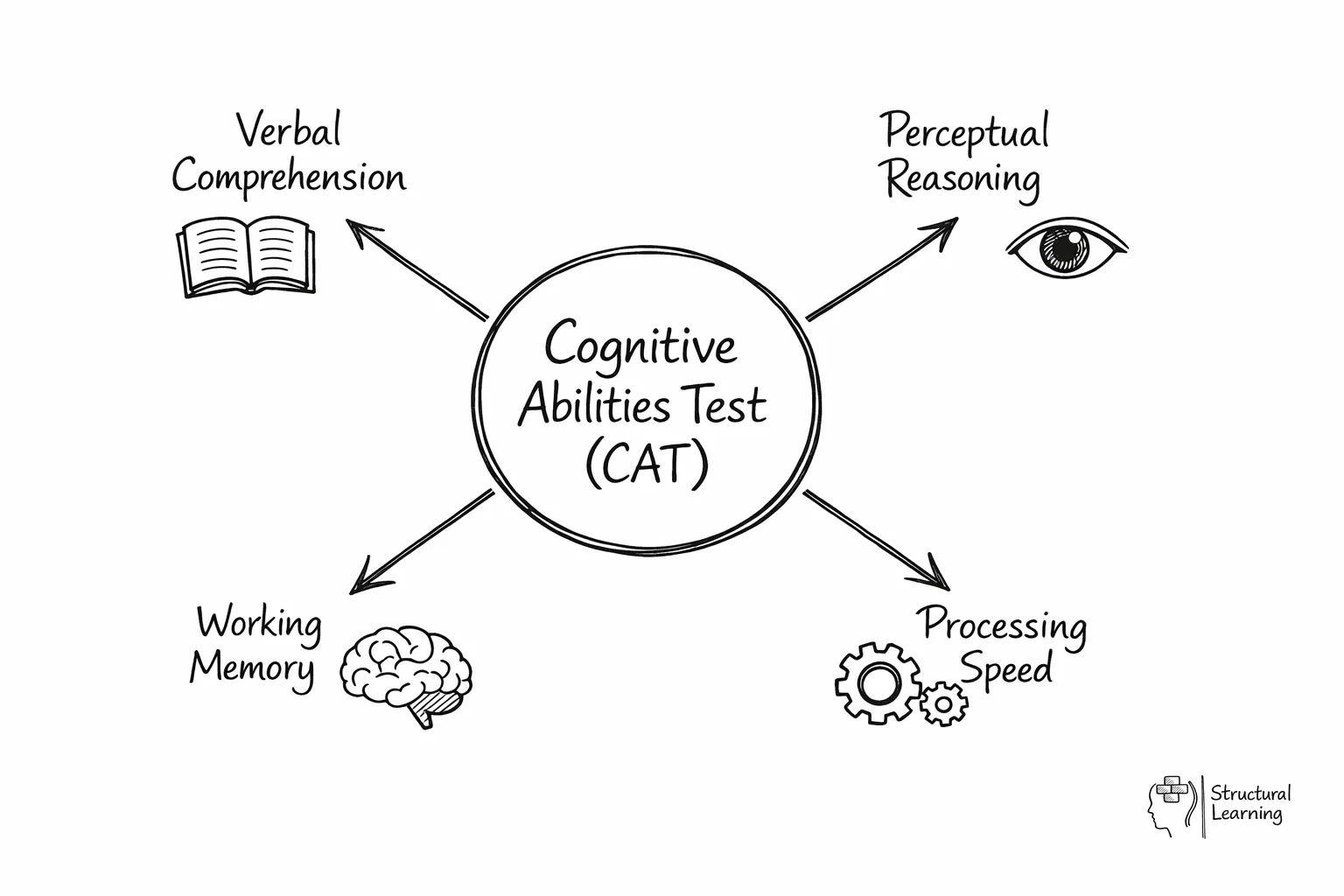Cognitive Abilities Test
Discover how Cognitive Abilities Tests enhance educational outcomes by identifying student strengths and tailoring learning strategies to boost performance.


Many colleges and schools use the cognitive abilities test (CAT) to explore pupil progress and to make important decisions about provision for their learners. Within the UK, many secondary schools use them as a gauge for general intelligence. Although they do provide teachers with extra judgement, they have often been criticised as offering a crude measure of ability. Utilised in the right way, they can help school systems provide support for those that face educational barriers.
The Cognitive Abilities Test (CAT) is a standardized assessment tool used to measure intelligence quotient (IQ). The CAT measures four different areas of cognition: verbal comprehension, perceptual reasoning, working memory, and processing speed.
There are two versions of the CAT: the paper-and-pencil version and the computerized version. Both versions use similar questions, although some questions may be slightly different.
The CAT is also used to help parents understand their children's strengths and weaknesses. Parents often find out that their child does poorly in school because he or she lacks certain skills. However, the results of cognitive abilities tests are not always that simple, there is usually a multitude of reasons why a child is not making as much progress as their peers.
Cognition refers to our ability to understand things we learn. We use this cognitive ability every day when we're trying to remember names, solve math problems, or figure out directions. Cognition is the brain's ability to process all the information it receives from the senses. The brain is the body's thought-processing centre and can be regarded as the engine room for learning. Cognition includes intellectual activities such as:
A Cognitive Abilities Test (CAT) is a standardized assessment that measures four areas of cognition: verbal comprehension, perceptual reasoning, working memory, and processing speed. Many UK secondary schools use CAT to gauge general intelligence and make decisions about educational provision for learners. The test comes in both paper-and-pencil and computerized versions with similar questions.

The Cognitive Abilities Test (CAT) was created by Dr. Robert Sternberg at Stanford University. The CAT is used worldwide to measure intelligence. Dr. Sternberg originally designed the CAT to help him understand his own students' strengths and weaknesses. He wanted to know whether he should offer extra credit points for tests taken outside class, or give them lower grades.
He found that his students who took the CAT scored significantly better than those who didn't take the critical thinking test. This led him to believe that the CAT was a valid tool for measuring intellig ence. Since then, the CAT has been used to measure intelligence in many different countries and cultures. Today, it's considered the most widely accepted IQ test in the world.
Types of questions asked in Cognitive Ability Test:
The cognitive test consists of a variety of questions from various fields. There is a variety of questions in this question to assess an individual intelligence. Most questions asked are of the following types:
Example: A car dealership has £600,000 to spend and wants to buy equal numbers of the Taber and Ursa cars. What is the largest number of each type of car that can be ordered?(A) 27 (B) 48 (C) 19 (D) 21 (E) 22
Example: The passage suggests that two-child families will dramatically increase, as sibling-free adults reach child-bearing age. (A) True (B) False (C) Cannot say
Example: Identify the next figure in the sequence.
Example: Which of the shapes is different from the others?
The CAT can be administered individually or in groups. It is typically administered by a school psychologist or other qualified professional. The test is timed, and students are given a specific amount of time to complete each section. The CAT scores are used to identify students who may need extra help in certain areas. For example, a student who scores low on the verbal comprehension section may need extra help with reading and writing.
CAT scores provide valuable insights into a student's cognitive strengths and weaknesses. These scores are typically presented as standard age scores (SAS), which have a mean of 100 and a standard deviation of 15. Here's a general guide to interpreting CAT scores:
consider the individual scores for each of the four cognitive areas (verbal comprehension, perceptual reasoning, working memory, and processing speed) to gain a comprehensive understanding of a student's cognitive profile.
Cognitive abilities tests provide educators with invaluable data that can be used to enhance teaching and learning. Here are some key benefits:
Ultimately, cognitive abilities tests serve as a valuable tool for promoting student success by providing educators with a deeper understanding of individual learning needs.
Cognitive Abilities Tests are valuable instruments, when used ethically and as part of a complete assessment. They are more than just a number; they offer a window into a child's cognitive landscape, helping educators and parents alike understand their strengths and areas for development. By combining these insights with careful observation and personalised teaching, we can create a learning environment where every child has the opportunity to thrive.
Remember, the true value of a CAT lies in the score and in the actions it inspires. Use the data wisely, and let it guide you towards creating a more supportive and effective learning journey for every student.
Many colleges and schools use the cognitive abilities test (CAT) to explore pupil progress and to make important decisions about provision for their learners. Within the UK, many secondary schools use them as a gauge for general intelligence. Although they do provide teachers with extra judgement, they have often been criticised as offering a crude measure of ability. Utilised in the right way, they can help school systems provide support for those that face educational barriers.
The Cognitive Abilities Test (CAT) is a standardized assessment tool used to measure intelligence quotient (IQ). The CAT measures four different areas of cognition: verbal comprehension, perceptual reasoning, working memory, and processing speed.
There are two versions of the CAT: the paper-and-pencil version and the computerized version. Both versions use similar questions, although some questions may be slightly different.
The CAT is also used to help parents understand their children's strengths and weaknesses. Parents often find out that their child does poorly in school because he or she lacks certain skills. However, the results of cognitive abilities tests are not always that simple, there is usually a multitude of reasons why a child is not making as much progress as their peers.
Cognition refers to our ability to understand things we learn. We use this cognitive ability every day when we're trying to remember names, solve math problems, or figure out directions. Cognition is the brain's ability to process all the information it receives from the senses. The brain is the body's thought-processing centre and can be regarded as the engine room for learning. Cognition includes intellectual activities such as:
A Cognitive Abilities Test (CAT) is a standardized assessment that measures four areas of cognition: verbal comprehension, perceptual reasoning, working memory, and processing speed. Many UK secondary schools use CAT to gauge general intelligence and make decisions about educational provision for learners. The test comes in both paper-and-pencil and computerized versions with similar questions.

The Cognitive Abilities Test (CAT) was created by Dr. Robert Sternberg at Stanford University. The CAT is used worldwide to measure intelligence. Dr. Sternberg originally designed the CAT to help him understand his own students' strengths and weaknesses. He wanted to know whether he should offer extra credit points for tests taken outside class, or give them lower grades.
He found that his students who took the CAT scored significantly better than those who didn't take the critical thinking test. This led him to believe that the CAT was a valid tool for measuring intellig ence. Since then, the CAT has been used to measure intelligence in many different countries and cultures. Today, it's considered the most widely accepted IQ test in the world.
Types of questions asked in Cognitive Ability Test:
The cognitive test consists of a variety of questions from various fields. There is a variety of questions in this question to assess an individual intelligence. Most questions asked are of the following types:
Example: A car dealership has £600,000 to spend and wants to buy equal numbers of the Taber and Ursa cars. What is the largest number of each type of car that can be ordered?(A) 27 (B) 48 (C) 19 (D) 21 (E) 22
Example: The passage suggests that two-child families will dramatically increase, as sibling-free adults reach child-bearing age. (A) True (B) False (C) Cannot say
Example: Identify the next figure in the sequence.
Example: Which of the shapes is different from the others?
The CAT can be administered individually or in groups. It is typically administered by a school psychologist or other qualified professional. The test is timed, and students are given a specific amount of time to complete each section. The CAT scores are used to identify students who may need extra help in certain areas. For example, a student who scores low on the verbal comprehension section may need extra help with reading and writing.
CAT scores provide valuable insights into a student's cognitive strengths and weaknesses. These scores are typically presented as standard age scores (SAS), which have a mean of 100 and a standard deviation of 15. Here's a general guide to interpreting CAT scores:
consider the individual scores for each of the four cognitive areas (verbal comprehension, perceptual reasoning, working memory, and processing speed) to gain a comprehensive understanding of a student's cognitive profile.
Cognitive abilities tests provide educators with invaluable data that can be used to enhance teaching and learning. Here are some key benefits:
Ultimately, cognitive abilities tests serve as a valuable tool for promoting student success by providing educators with a deeper understanding of individual learning needs.
Cognitive Abilities Tests are valuable instruments, when used ethically and as part of a complete assessment. They are more than just a number; they offer a window into a child's cognitive landscape, helping educators and parents alike understand their strengths and areas for development. By combining these insights with careful observation and personalised teaching, we can create a learning environment where every child has the opportunity to thrive.
Remember, the true value of a CAT lies in the score and in the actions it inspires. Use the data wisely, and let it guide you towards creating a more supportive and effective learning journey for every student.
{"@context":"https://schema.org","@graph":[{"@type":"Article","@id":"https://www.structural-learning.com/post/cognitive-abilities-test#article","headline":"Cognitive Abilities Test","description":"Discover how Cognitive Abilities Tests enhance educational outcomes by identifying student strengths and tailoring learning strategies to boost performance.","datePublished":"2022-10-07T14:17:35.493Z","dateModified":"2026-01-26T10:09:32.212Z","author":{"@type":"Person","name":"Paul Main","url":"https://www.structural-learning.com/team/paulmain","jobTitle":"Founder & Educational Consultant"},"publisher":{"@type":"Organization","name":"Structural Learning","url":"https://www.structural-learning.com","logo":{"@type":"ImageObject","url":"https://cdn.prod.website-files.com/5b69a01ba2e409e5d5e055c6/6040bf0426cb415ba2fc7882_newlogoblue.svg"}},"mainEntityOfPage":{"@type":"WebPage","@id":"https://www.structural-learning.com/post/cognitive-abilities-test"},"image":"https://cdn.prod.website-files.com/5b69a01ba2e409501de055d1/696a1f93cd5bc3816a66f099_696a1f8d70b608ee06c53a87_cognitive-abilities-test-illustration.webp","wordCount":2943},{"@type":"BreadcrumbList","@id":"https://www.structural-learning.com/post/cognitive-abilities-test#breadcrumb","itemListElement":[{"@type":"ListItem","position":1,"name":"Home","item":"https://www.structural-learning.com/"},{"@type":"ListItem","position":2,"name":"Blog","item":"https://www.structural-learning.com/blog"},{"@type":"ListItem","position":3,"name":"Cognitive Abilities Test","item":"https://www.structural-learning.com/post/cognitive-abilities-test"}]}]}